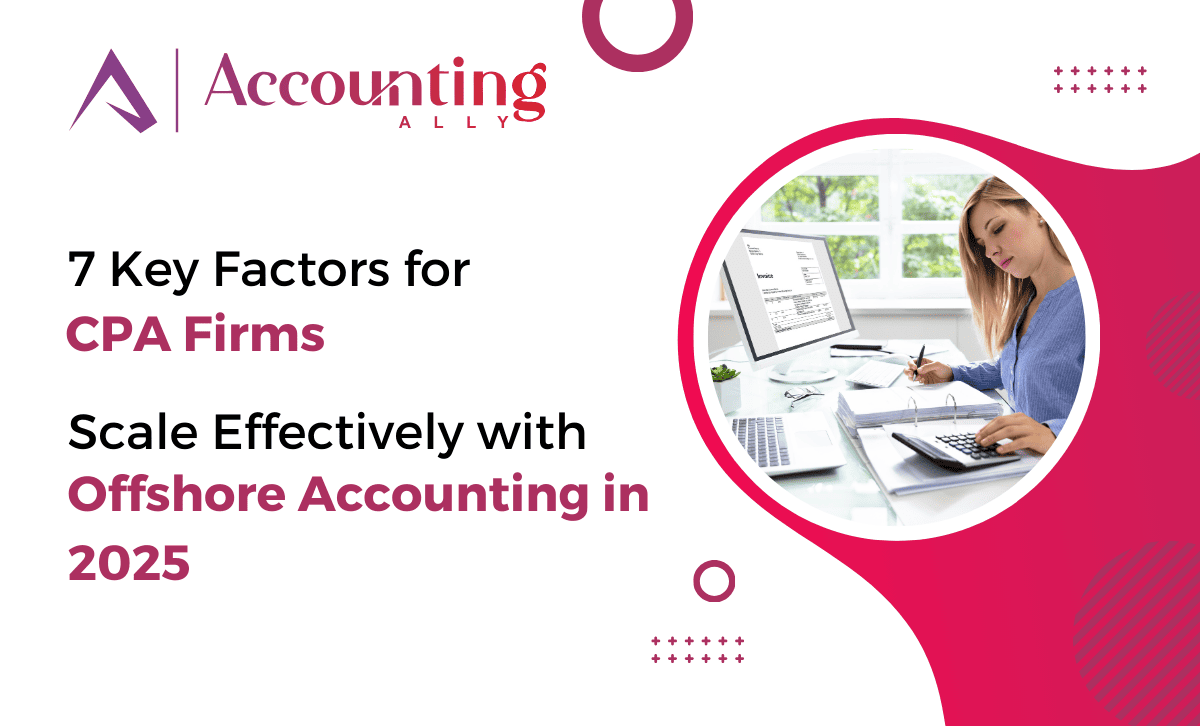7 Key Factors for CPA Firms to Scale Effectively with Offshore Accounting in 2025

Scaling a CPA firm in the United States requires strategic resource management, cost control, and efficient service delivery. Offshore accounting has emerged as a powerful solution for firms seeking growth while maintaining high-quality standards. By understanding key factors and implementing the right strategies, CPA firms can effectively scale operations through outsourced accounting solutions.
The Growing Importance of Offshore Accounting
Offshore accounting services have transformed how CPA firms operate, especially in today’s competitive landscape. Outsourcing accounting to countries like India, a global hub for skilled professionals, has become a popular choice due to its cost benefits and access to expertise.
Key Factors for Effective Scaling with Offshore Accounting
For CPA firms to maximize the benefits of offshore accounting, attention must be given to these critical factors:
1. Defining Clear Objectives
Before outsourcing, establish what you aim to achieve:
- Are you looking to reduce costs?
- Do you need support during tax season?
- Are you expanding services for small businesses?
A well-defined objective ensures alignment between your firm and the offshore partner.
2. Choosing the Right Outsourcing Partner
Selecting the right partner is crucial for success. When choosing an accounting outsourcing partner, consider:
- Experience and Expertise: Look for firms with a proven track record in outsourced accounting solutions.
- Data Security Protocols: Ensure ISO-certified practices and IT compliance.
- Customizable Services: The partner should adapt to your unique processes and requirements.
- Communication Channels: Frequent video calls and updates foster better collaboration.
3. Balancing Outsourcing vs. In-House Accounting
Understand which tasks to outsource and which to retain in-house:
- Best for Outsourcing: Repetitive tasks such as bookkeeping, payroll, and data entry.
- In-House Focus: Strategic activities like client management and advisory services.
A hybrid model ensures seamless operations and cost benefits of accounting outsourcing.
4. Implementing a Strong Transition Plan
Transitioning to offshore accounting services can be challenging without proper planning. Key steps include:
- Creating SOPs: Define standard operating procedures for outsourced tasks to minimize errors and ensure consistency.
- Knowledge Transfer: Conduct training sessions and prepare detailed client-specific documentation, such as the Client Specification Builder (CSB).
- Setting Metrics: Establish SLAs for turnaround times, accuracy, and productivity to measure success objectively.
5. Leveraging Cost Benefits
Outsourcing accounting to India offers unparalleled cost savings. According to the U.S. Bureau of Labor Statistics, the median annual wage for bookkeeping, accounting, and auditing clerks was $47,440 in May 2022. When factoring in benefits, the total cost can reach approximately $60,000 per year. In contrast, outsourcing these services can reduce costs by 30-50%, resulting in substantial savings. (Source)
6. Ensuring Data Security
Data security is a top priority when outsourcing. CPA firms should:
- Work with partners who follow ISO 27001 standards.
- Use secure portals like SharePoint for file sharing and communication.
- Regularly update passwords and restrict access to sensitive information.
With data breach costs reaching record highs, outsourced accounting firms are investing in advanced cybersecurity measures to protect sensitive financial information and ensure compliance with stringent data protection regulations.
7. Measuring Success and Continuous Improvement
Monitor your offshore strategy’s performance with measurable KPIs:
- Turnaround Time (TAT): Ensure tasks are completed within deadlines.
- Accuracy: Maintain a 99.5% accuracy rate or higher.
- Client Satisfaction: Regularly collect feedback to improve processes.
Frequent reviews help identify gaps and refine the outsourcing strategy.
The Future of Accounting Outsourcing
As technology advances, the future of accounting outsourcing looks promising. Automation, AI, and advanced analytics will further streamline operations, making offshore accounting even more efficient. CPA firms embracing these trends will gain a competitive edge in scaling operations. Notably, venture capitalists are investing in accounting firms, driven by the potential of generative AI to transform traditional services, making them more profitable and scalable. (Source)
Frequently Asked Questions (FAQs)
- What are the primary benefits of outsourcing accounting services for CPA firms?
Outsourcing accounting services offers several advantages, including cost savings, access to skilled talent, scalability, and the ability to focus on core services. By reducing overhead costs and leveraging external expertise, CPA firms can enhance efficiency and service quality.
- How can CPA firms ensure data security when outsourcing accounting functions?
To ensure data security, CPA firms should partner with outsourcing providers that adhere to international security standards, such as ISO 27001. Additionally, using secure communication channels, regularly updating passwords, and restricting access to sensitive information are crucial practices.
- How does outsourcing accounting help CPA firms scale effectively?
Outsourcing allows CPA firms to access a larger talent pool, reduce operational costs, and focus on expanding service offerings. It provides flexibility to scale resources during peak seasons or business growth, ensuring consistent service delivery.
- What tasks are best suited for outsourcing in a CPA firm?
Repetitive and time-consuming tasks such as bookkeeping, payroll processing, tax preparation, and accounts reconciliation are ideal for outsourcing. This allows in-house teams to focus on client management and advisory roles.
Conclusion
Offshore accounting provides CPA firms with a powerful tool to scale effectively. By partnering with the right outsourcing provider, firms can achieve cost efficiency, improve service delivery, and maintain data security. A strategic approach to outsourcing—focused on measurable goals, robust transitions, and continuous improvement—can drive long-term success. With technological advancements and growing trends in outsourcing, CPA firms have an unprecedented opportunity to enhance operations and stay competitive in a dynamic market.



